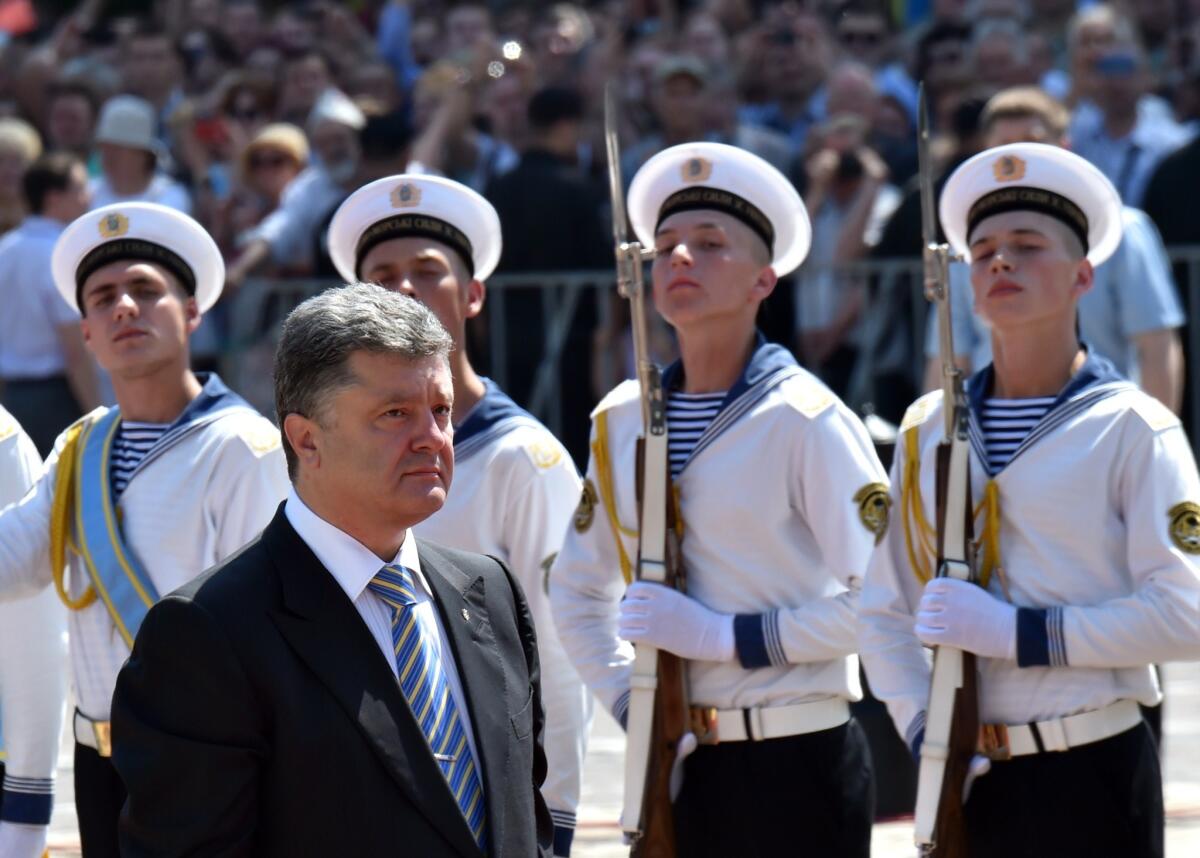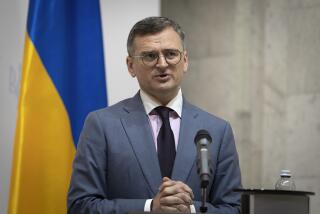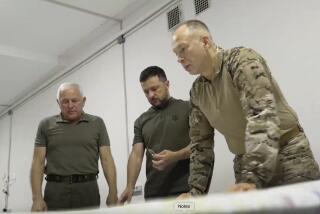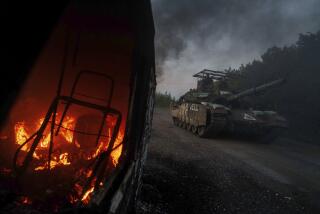Ukraine’s new president vows to pursue peace

As fighting continued in eastern Ukraine, billionaire-turned-politician Petro Poroshenko, who was sworn on Saturday as the fifth president of post-Soviet Ukraine, offered a peace plan to resolve the bloody conflict in the industrial Donbass region.
“I know that peace is the main thing the Ukrainian people want today,” the 49-year-old president said during a solemn but far from pompous inauguration ceremony Saturday morning in parliament.
“I don’t want war, I don’t want revenge despite the massive casualties sustained by Ukraine’s people, which are in front of our eyes. I want peace and I will achieve Ukraine’s unity.”
Poroshenko took the presidential oath in the presence of dozens of lawmakers, officials, dignitaries and numerous foreign leaders and envoys, including Vice President Joe Biden and State Department official Victoria Nuland.
Holding his right hand on a 16th century New Testament, Poroshenko offered amnesty for pro-Russia militants provided they “do not have the blood of Ukraine soldiers and peaceful residents on their hands and those who were not involved in financing terrorism.”
More than 200 people have been killed in the last two months of heavy fighting between government troops and separatist gunmen in the Donetsk and Luhansk regions of southeast Ukraine, officials recently said.
Poroshenko offered to create “controlled corridors” for the evacuation of Russian mercenaries back to Russia, after which a peaceful dialogue would be possible with newly elected regional and local authorities.
But Poroshenko surprisingly blamed only Victor Yanukovich, the ousted Ukrainian leader, and his clan, who are now living in Russia, for backing the separatists, and did not directly lash out at the Kremlin, perhaps because of the brief but positive meeting that Poroshenko had with his Russian counterpart, Vladimir Putin, at D-day memorial ceremonies in Normandy, France.
Poroshenko spokeswoman Irina Friz wrote on her Facebook account Friday that both presidents agreed to work toward a peaceful solution and “to take joint action to close the border in the area of military conflict and prevent constant Ukrainian border crossing by Russian militants.”
The next positive signal came the same day as Russian ambassador Mikhail Zurabov, who had been absent from his office since February, returned to Kiev and was seen among the diplomats at the Saturday ceremony.
Zurabov is expected to initially represent Russia in long-awaited talks with Ukrainian officials that are expected to begin Sunday, said Volodymir Fesenko, a Kiev-based political scientist.
“Zurabov is ideal for this role as he and Poroshenko have long been very good friends,” said Fesenko, director of the Penta Center for Applied Political Studies. “Even Putin himself now understands that the prolongation of the violent conflict in Ukraine is not in his interests either, and now that the legitimacy of Kiev authorities is hard to dispute, the Kremlin has to work together with Kiev to find a way to stop the bloodshed.”
But Poroshenko was adamant about Russia’s annexation of Crimea and implied that there could be no compromise on the peninsula’s status.
“Russia occupied Crimea, which is and will be Ukrainian,” Poroshenko said in his speech, prompting a standing ovation. “Yesterday during the meeting in Normandy, I said exactly that to President Putin, that Crimea belongs to Ukraine.”
Poroshenko rejected as gibberish the idea of the federalization of Ukraine, long proposed by Russia and declared by the pro-Russia rebels. Poroshenko pledged that Ukraine will remain a single state with the Ukrainian language the only state tongue.
But he guaranteed “a free development” for Russian and other languages in Ukraine, and to prove his point he read a part of his speech specifically addressed to the residents of the volatile Donetsk and Luhansk regions in Russian.
Poroshenko -- who won a majority of ballots in all regions of Ukraine except Donetsk and Luhansk, where separatists sabotaged the presidential poll May 25 -- “enjoys enough popular trust to break the situation, resolve the conflict and and lead Ukraine to Europe,” Fesenko said. “But he needs to act fast.”
“People have such high expectations of Poroshenko after everything we have been through in recent months,” said university student Sergey Denysenko, 22. “He will not be forgiven if he fails.”
“I understand we are at a war and he has to handle it,” said pensioner Yevgeniya Karpenko, 67, “but he was elected for the whole term and I expect him to handle social and economic problems as well.
“I am not complaining, but I think everybody here would like to live better. There is so much potential in this country, so many opportunities.”
Poroshenko promised to provide jobs and “decent wages as the first guarantee of internal peace and national security.”
As Poroshenko was talking peace and reform, mortars were fired at a power station near the town of Slovyansk, the epicenter of fighting in eastern Ukraine, causing the evacuation of technical personnel and cutting off electricity to part of Slovyansk and about 40 towns and villages in the surrounding district, the UNIAN news agency reported.
Two Ukrainian army soldiers were wounded Saturday morning as pro-Russia gunmen attacked a government checkpoint near Slovyansk, Dmitry Tymchuk, head of the Kiev-based Center for Military and Political Research, said on his Facebook page.
Poroshenko has promised to sign an association and trade agreement with the European Union as soon as possible, saying that Ukriane is united around European integration.
“We, the people who were torn away from our great motherland -- Europe -- are returning to its fold,” he said.
More to Read
Sign up for Essential California
The most important California stories and recommendations in your inbox every morning.
You may occasionally receive promotional content from the Los Angeles Times.










